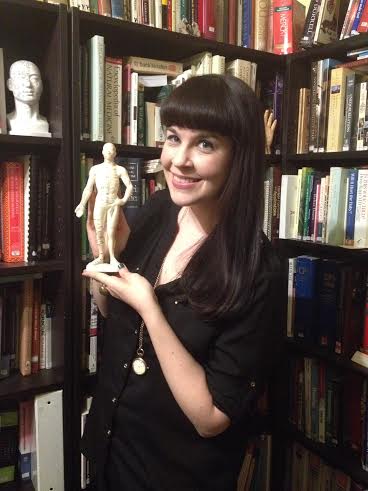Caitlin Doughty wants to remind you that someday you and everyone you know will die. Okay, perhaps those aren’t her exact words but as the creator of The Order of the Good Death and the hilariously camp yet informative YouTube series “Ask a Mortician,” death acceptance is a topic that Caitlin explores on a regular basis. At a recent appearance in Toronto, I was able to sit down with Caitlin to discuss goodbyes, dying, all things related to the Big Sleep. To start with, given our culture’s skittish attitude towards death, I wondered if Caitlin was at all surprised at her website’s growing popularity. “The popularity was surprising but not so much anymore because I’ve so consistently seen over the past few years how much people need it,” she said. “And how much people desperately want to talk about death and dying and their own mortality.”
However, this desire to talk about death isn’t necessarily shared by our culture at large. While I have no problems with the subject, it was reassuring to know that Caitlin understood my difficulties in finding people who are comfortable with discussing death. Still, she insists that it’s a conversation that needs to be had. “It’s important for those of us who think that death being back in culture is a crucial thing to stop apologizing,” she explains. “It’s a fundamental human fact that we all share and people who think it’s weird are in a kind of deep denial about it. Talking about [death] in a rational open way is not the pathology, hiding it is the pathology.”
I question whether North America’s ideal of being happy 24/7 is part of what makes so many people avoid talking about death, which can at times be uncomfortable. Caitlin explains, “A state of constant happiness is not sustainable and would be incredibly unhealthy. Studies have proven that people who are told to be optimistic when they are grieving end up feeling so much worse because they can feel the disconnect between what they’re feeling and being told to be happy. That kind of attitude leads to grief being pathologized and people seeing grief that lasts longer than a week as a problem.”
Avoidance of death is widespread not only in our cultural refusal to have frank conversations about it, but also in the obsession to prolong life. It seems as though every week a new wonder food or special exercise is being touted as the secret to “longevity.” But in the medical world, efforts to avoid death can be even more extreme. “[Just because] there are so many things we can do now doesn’t mean we should do them,” Caitlin says. “A 95-year-old doesn’t need a pacemaker or an operation to keep them alive at all costs. But young doctors who are coming out of the medical system are being taught that death is failure.” When it comes to extreme life-saving measures, Caitlin believes that if people were given the support to choose differently (ie. avoiding ventilators or multitudes of medication and accepting death as the natural order of life) they would make different decisions.
So what can we do to change our culture’s death-averse attitude? To start with, Caitlin insists that talking about it doesn’t mean she’s minimizing the pain and grief that accompanies death. “The message isn’t that death is easy; the message is that there is beauty in the grotesque and painful. There is a lot to death that is horrible and difficult and profound but it’s part of the human experience and the good should be found in it, which is not the same as saying ‘Death is good!’” The best thing we can do to change the conversation, Caitlin insists, is to keep talking. “You have to be almost evangelical about it and willing to go to the mat again and again so that even when someone says ‘I don’t want to talk about it’ you can just say ‘Okay, we’ll talk about it next time.’ There will probably never be an Intervention ‘come to Jesus’-style moment. It has to be chipped away at over time.”
Surprisingly, Caitlin reveals that her own parents are her toughest customers when it comes to making end-of-life arrangements, but she’s seen some small improvements. “Recently when I went home my mom told me that if anything should happen to her I could find a list of all her passwords and important information in her desk. And that’s actually a huge breakthrough for her!” At this point I decide to ask Caitlin for some personal advice and explain that within my own family, whenever I bring up funeral planning my dad reacts as though I am saying that I want him to die immediately. “Well, you have to remind him that just like talking about sex won’t make you pregnant, talking about death won’t make you dead.” Her advice brings me a renewed sense of energy. Talking about death isn’t the easiest thing in the world, but Caitlin is fighting the good fight and doing her best to bring the conversation back into popular culture. I’ll continue talking about death amongst my friends and family and hope that eventually death is seen as just another topic of conversation—hey, it happens to everyone.



 Follow Us On Instagram
Follow Us On Instagram
